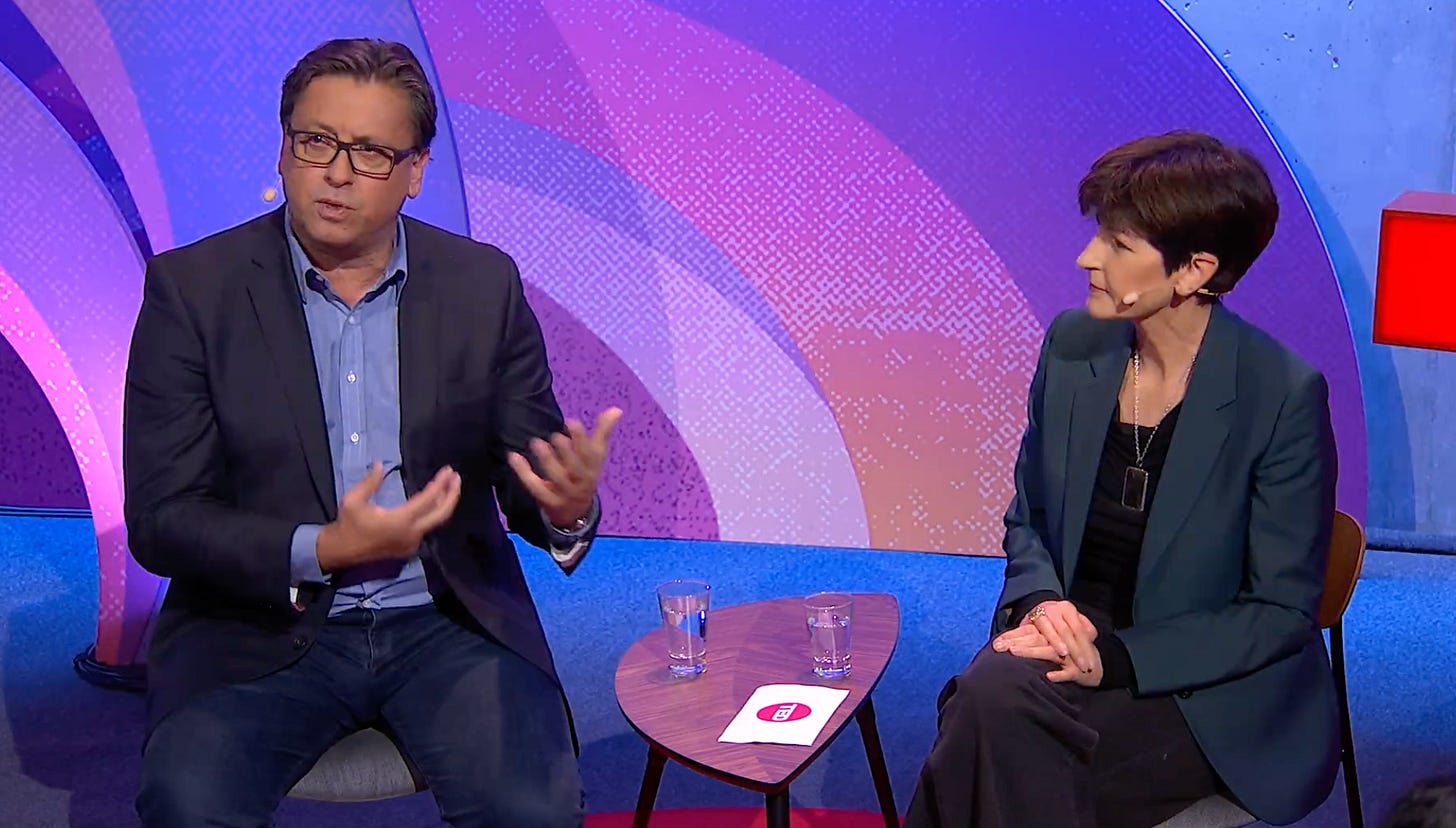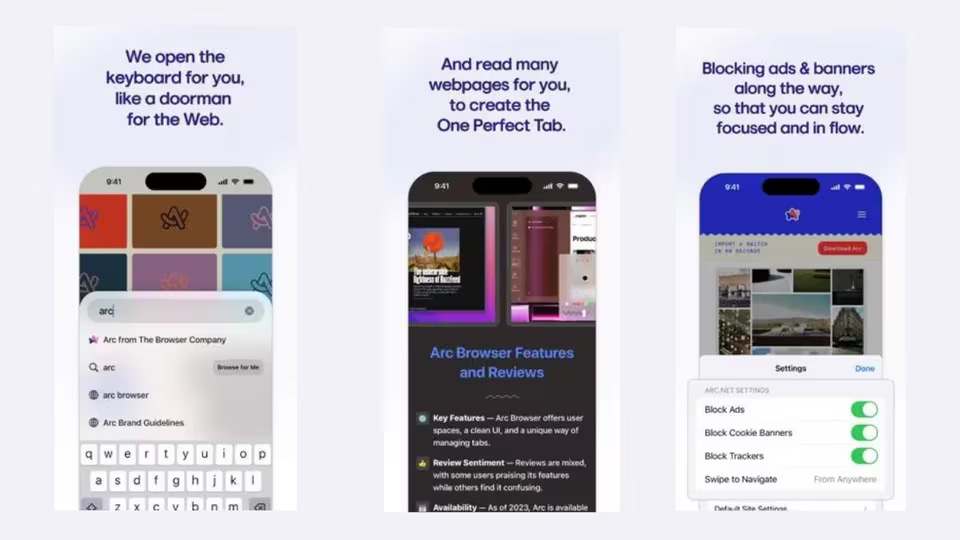How to lead in the age of AI, copyright, and more notes on the ‘death of search’
The latest most transformational stories you need to know.
Dear Reader,
Welcome back to BN Edition: concise analysis on the stories that offer us hints at our unfolding future. Fresh from the desks of the Brilliant Noise team.
Each edition takes a handful of stories from recent weeks and asks three things:
What? The story in a few sentences.
So what? Why do I need to know?
What next? What do I need to do, and what do I need to watch out for?
This week, find out more about:
How to be a great leader in the age of AI
Copyright in the age of AI
More notes on the ‘death of search’
Let’s get into it.
How to be a great leader in the age of AI
What?
Paul Hudson, CEO of one of our clients, the global pharmaceutical company Sanofi, gave the perfect briefing on how to be a leader in the age of AI to Ted.
As well as discussing the company's ambition to be THE leading pharmaceutical company using AI at scale, the role of AI in decarbonising the healthcare industry he also talks about AI’s ability to create more meaningful work and the potential to create a competitive advantage.
Source: A 17 minute Listen or Watch, Ted Talks Daily
So what?
Paul is one of few global CEOs going all in on AI. His perspective offers deep insights into what business leadership is about in the age of AI.
Here are a few pertinent quotes:
On how leaders are responding to AI:
“I'm surprised at the number of CEOs or executives who – Their first response to an AI conversation is "Governance, controls, rules, principles." Of course, everything has its place, but I think we have to be honest with ourselves. If it is the fourth industrial revolution, which we believe it is, then hesitating, this fear can take over, can deprive you of so much opportunity. And you have to go for it. I find that when you talk to lots of CEOs, they really are very hesitant. Some would say even frightened.”
On how AI affects jobs:
”The adoption of AI in particular is not about jobs. And I know people will think that and inevitably, more meaningful work is created. And of course, some roles change or some skills don't match. But in the end, it's really about using artificial intelligence to create this real momentum of decision making and to be able to take such an advantage over the competition.”
On his AI ambition:
“At Sanofi, we aim to be the world's leading pharmaceutical company using AI at scale. We're boldly taking on the opportunity to completely disrupt the business. We don't have a choice. It's the fourth industrial revolution. It's here whether we like it or not…Our aim is to provide daily decision intelligence, to give people a sort of nudge in the right direction, to give them deeper insights, to allow them to be more effective at what they do.”
I'm incredibly excited about the use of artificial intelligence, particularly large language models…It's got me questioning whether I can go back and look at medicines that didn't quite make it, and wonder if we just didn't know enough with the data that we had to look deep enough.
AI for me, a relatively new CEO, I have a chance to take away the heavy lifting – the unglamorous work that people don't like doing. I've a chance to reinvent everything, to do it more efficiently, and reinvest in R&D. And I have a chance to get ahead of the competition while they're all worrying. But we can do incredible things for patients and for the people in the company by being more bold about stepping into the new world.”
What next?
Read the signals: For marketing and business leaders, Sanofi's aggressive stance on AI adoption is a clear signal of the technology's pivotal role in shaping future business. Paul's insights reveal an urgency for leaders to overcome hesitation and integrate AI as a priority, not just for competitive advantage but also for creating more meaningful work.
Speed up decision-making: Paul talks about AI allowing him to be able to see insights at the same time as everyone else in the company, rather than waiting for them to be presented to him. That means shorter loops, fewer filters and faster decision-making.
Leadership: AI brings a certain amount of new democracy into an organisation. Paul talks about the imperative to integrate AI thoughtfully – being mindful of its impact on the workforce, society, and the environment.
Copyright in the Age of AI
What?
The UK government just published an update to its March 2023 AI regulation white paper that is ‘pro-innovation and pro-safety’. But the industry group advising on copyright issues couldn't agree on an approach, and gave the knotty problem back to government ministers unsolved.
Source: UK shelves proposed AI copyright code in blow to creative industries, The Financial Times
So what?
The UK government's Intellectual Property Office failed to agree on a voluntary code of practice for training artificial intelligence (AI) models using copyrighted material.
Consequently, the updated regulation does not specifically address copyright issues related to creative works used to train generative AI models like ChatGPT.
The code would have guided text and data mining, which involves using existing materials like music and books to train AI models. Industry executives from arts and news organisations, including the BBC and the Financial Times, as well as tech companies such as Microsoft and DeepMind, were unable to agree on terms.
What next?
The issue of creative copyright is a complex one. But it helps to think about who wins in the end. And that’s big tech.
As the artist Anish Kapoor said, “Everything is a remix”. Everyone borrows, steals and combines ideas and techniques to create new creative ideas. Ideas happen in networks not in the private IP-generating fenced off mind of a copyright holder.
In the past, the frame of laws and regulations has meant you can own an idea. The most powerful corporations with a say in the matter liked that idea and made it stronger and stronger. When copyright started, an author had rights to their work for a couple of decades. Once copyright became a guarantee of a revenue stream for larger organisations, it was extended again and again.
Rights management and copyright have not kept up with technology. For example, your Kindle books, the albums on your Spotify, the Movies on your Amazon account. We’ve paid for these pieces of art, but we don’t own them, we can’t lend them, we’re allowed to look at them. When we die our uniquely curated “libraries” will die with us.
The conversation is ongoing. We still need clear guidelines on the use of copyrighted materials. Regulation will happen, but the what and the when is still unknown.
Until then:
Stay informed: We’ll keep reporting on this issue. And leaders should stay informed on evolving AI regulations and copyright discussions, preparing for potential impacts on content creation, AI application, and intellectual property rights and anticipate changes that may affect business operations or content monetisation.
Engage: Proactively engage in industry discussions and consultations on AI and copyright to advocate for policies that support innovation while protecting creators' rights in a rapidly changing digital environment.
Be proactive: Review and adjust content strategies to ensure compliance with current and future regulations, emphasising ethical AI use and copyright respect.
More notes on the ‘death of search’
What?
In last week’s newsletter, we asked the question ‘Is AI killing Search?’. This week, we’d like to add an extra layer to that story.
Enter Arc Search, a new AI-powered iOS app from The Browser Company that imagines a whole new future for the internet.
So what?
Search engines like Google need browsers like Chrome for distribution. It’s where their searches come from, and therefore it's the source of their revenue. But what happens when the big boys are overthrown by next generation AI browsers like Perplexity? The browser Company is one of the first software companies to explore that question, and their answer is Arc Search.
We’re all used to typing in a search query and browsing results to find what we want.
With Arc Search, you type in a query and it builds you a dynamic web page rather than producing a linear scrolling experience.
From a product standpoint, Arc Search seems to imagine the future of AI-driven search differently than existing AI browsers or tools like Copilot and Bing. Arc Search proposes a new concept: an AI that not only navigates the web but also creates a bespoke webpage for each query, offering a unique and dynamic exploration experience.
It’s fast, it looks great and crucially, it blocks ads, banners cookies and trackers.
What next?
Arc Search signals (YET ANOTHER) pivotal shift as we delve deeper into the implications of AI's role in reshaping search and the effect of AI-driven browsers on the digital ecosystem.
Three questions we’re going to hold close as this unravels:
How will traditional search engines adapt?
What does this mean for user privacy and the overall web experience?
What other innovative solutions will emerge that promise to redefine our online interactions?
Thank you for reading.
The Brilliant Noise team







